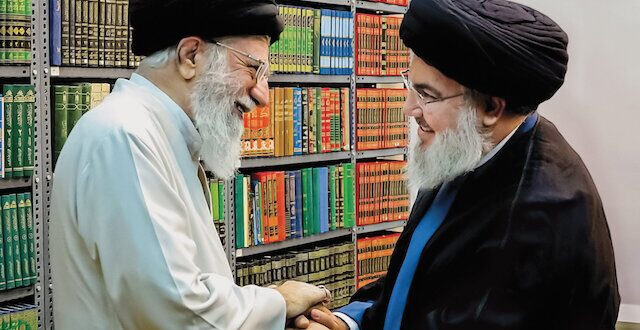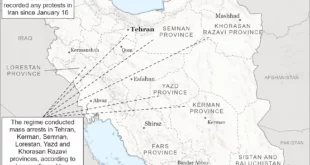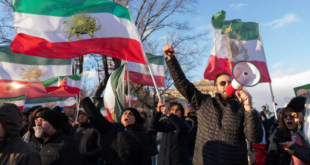On Monday “Supreme Guide” Ali Khamenei said that “liberating Palestine” is the “number one goal of the Islamic ummah”, making it clear that even if the “nuclear deal” is revived, the clash of two visions on the future of the Middle East will not come to a close.
The Iranian side is also trying to have over 1,000 sanctions imposed on the Islamic Republic for issues not related to the “nuclear deal” lifted without offering any concessions in return.
Rouhani’s spokesman dropped another bombshell: whatever deal is made by officials representing the formal government of Iran in Vienna would have to be approved by “higher-up” in Tehran. In other words Khamenei would have a veto that he could exercise anytime he deems propitious.
Once the sham election is over [Khamenei] could revert to the “retreat-then-cheat” tactic that he describes as “heroic flexibility”. The tactic has been used in numerous cases besides the hare-brained scheme concocted by former President Barack Obama, including a variety of deals Tehran made with the European Union, China and Russia.
Today, none of those factors [of 40 years ago] are in play. The Cold War has ended, Iran has been knocked out of the oil market and Arabs are moving towards normalization with Israel for reasons of their own.
Foreign Minister Mohammad Javad Zarif estimates that the zombie regime in Tehran needs a minimum of $60 billion a year to stay erect and do the mischief it needs to do to survive.
The Vienna talks may end up providing the extra cash Tehran needs to stay in the game. The question Biden needs to ask is this: would such an outcome serve the interests of the US, not to mention that of the Iranian people, who are now thirsty for a change of direction?
Judging by what Iranian and US diplomats involved in the current talks to revive the moribund “nuclear deal” say, the widow of opportunity opened by Joe Biden’s victory in last year’s presidential election is likely to shut within the next few weeks.
The Iranian side claims that only an agreement reached while President Hassan Rouhani’s team is still in charge, at least nominally, would have a real chance of being pushed through the hurdles set against any international accord by the Islamic Republic. For the US side, however, the problem is that while President Biden is keen to clinch a deal in the hope of normalization with the Khomeinist regime, he cannot be sure that the Iranian team in Vienna would be able to deliver on any promises it makes.
It is clear that both sides are working to whip up a mountain of fudge to bury their deep-rooted differences under a simulacrum of a deal on what is a fake issue. Tehran would promise to dismantle a number of centrifuges that it has set in motion to enrich uranium for a bomb it says it never wanted and would never seek. That promise would enable Biden to claim a diplomatic victory and brag about having prevented a nuclear arms race in what is the most unstable region in the world. In exchange, the US will help the mullahs alleviate their cash-flow problem and secure enough money to pay their security forces at home and their “jihadis” abroad.
The problem is that conjuring such a trick may not be that easy.
To start with, sensing that the American side is keen on producing the fudge, the Iranian side is raising the stakes.
On Monday “Supreme Guide” Ali Khamenei said that “liberating Palestine” is the “number one goal of the Islamic ummah”, making it clear that even if the “nuclear deal” is revived, the clash of two visions on the future of the Middle East will not come to a close. The following day, Rouhani’s spokesman Ali Rabi’i said Iran intended to raise the Palestine issue and “rebuilding the region” at the Vienna negotiations. The Iranian side is also trying to have over 1,000 sanctions imposed on the Islamic Republic for issues not related to the “nuclear deal” lifted without offering any concessions in return.
Rouhani’s spokesman dropped another bombshell: whatever deal is made by officials representing the formal government of Iran in Vienna would have to be approved by “higher-up” in Tehran. In other words, Khamenei would have a veto that he could exercise anytime he deems propitious. That would enable Khamenei to use the putative deal as a “feel-good” prop to persuade more Iranians to take part in the forthcoming presidential elections which he is marketing as a referendum on his regime’s legitimacy. Once the sham election is over he could revert to the “retreat-then-cheat” tactic that he describes as “heroic flexibility”. The tactic has been used in numerous cases besides the hare-brained scheme concocted by former President Barack Obama, including a variety of deals Tehran made with the European Union, China and Russia.
The zeal with which the American side is chasing a deal in Vienna is rooted in an old illusion that Biden has harbored about the Iranian Revolution since 1979. For reasons that I am unable to fathom, even a young Senator Biden had a soft spot for the Khomeinist revolution that toppled the Shah’s regime.
In 2004 in Davos, Switzerland, Biden had a long meeting with Kamal Kharrazi then the mullahs’ foreign minister, expressing the hope that a future Democrat administration would continue President Bill Clinton’s initial opening to Tehran, supposedly halted under President George W Bush.
What Biden didn’t know, or chose to ignore was that Kharazzi was, in the words of European Union’s foreign policy coordinator Chris Patten, “an actor playing foreign minister.”
Biden didn’t know another thing: the entire Khomeinist project is erected on a mystico-ideological anti-Americanism without which the mullahs’ regime would feel vulnerable.
Young Biden’s fascination with the Khomeinist revolution may have been understandable 40 or so years ago. The Shah had been vilified by a good chunk of the American media, academic and political elites for decades. Time magazine called Ayatollah Khomeini “The Gandhi of Islam” and put him on its cover. Henry Precht, the diplomat in charge of Iran policy in President Jimmy Carter’s administration, reminded everyone that, after all, the US came into being with a “revolution against a king”. It is also an established fact that Americans are often more forgiving of their foes than they are of their friends.
In more concrete terms, Iran was far more important 40 years ago than it is today. Covering the Soviet Union’s second-longest border it was a valuable asset in the context of the Cold War. Carter’s National Security Adviser Zbigniew Brzezinski mused about an Islamic “green lasso” thrown against the Soviet Empire. At the time, the US also needed the Middle East’s oil while it could use a perceived Iranian threat against Arabs as a means of easing their pressure on Israel.
Today, none of those factors are in play. The Cold War has ended, Iran has been knocked out of the oil market and Arabs are moving towards normalization with Israel for reasons of their own.
Thus there is no urgency in rescuing the Khomeinist regime from the purgatory it has created for itself. The Islamic Republic today is a pale shadow of what it was 40 years ago when it seduced Biden. Moving towards the edge of what might become systemic collapse, Ayatollah Khamenei looks like a clueless captain in a wayward ship in a perfect storm.
Foreign Minister Mohammad Javad Zarif estimates that the zombie regime in Tehran needs a minimum of $60 billion a year to stay erect and do the mischief it needs to do to survive.
The Vienna talks may end up providing the extra cash Tehran needs to stay in the game. The question Biden needs to ask is this: would such an outcome serve the interests of the US, not to mention that of the Iranian people, who are now thirsty for a change of direction?
 Eurasia Press & News
Eurasia Press & News




